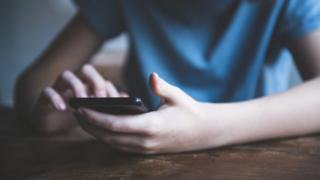Childhood: 'They don't have the freedom we had as children'
 Image copyright
Getty Images
Image copyright
Getty Images
"Childhood is very much worse - there is a great deal of difference," says grandfather of 17 Norman Williams.
"The freedoms we had when I was a child and the things I could do without any fear of bad actions from people. Children these days are stuck.
"They stay at home and stare at a screen. They are not off their phones - ever," says Norman, 72.
His views come as a survey finds 60% of parents and 62% of grandparents think childhoods today are getting worse.
The poll, by the charity Action for Children, surveyed 1,559 parents and 1,379 grandparents of children 11 to 18-year-olds.
The charity also questioned 2,082 children 11 to 18-year-olds and found 91% were worrying about "adult issues" such as Brexit and poverty.
Over a third (38%) of children thought threats to their safety through technology and social media were obstacles to a good childhood.
Norman, from Torquay, in Devon, says that while bullying was around in his day, cyber-bullying has "nothing to control it".
"It is so much harder now for kids, especially when it is online," he says.
"There is no physical side. It's all verbal and it gets inside your head more.
"The government is too self-centred to worry about anything outside of their doors.
"If it is going to cost them money, they don't care. They have no interest in children at all."
Norman's grandson Joshua, 13, says there is huge pressure to fit in and have the latest technology.
"If you don't have a phone or electronics, you get called poor," he says.
"I have a phone - but if people see me with it, everybody says it is terrible and that I need a new one."
He also says watching the news is "never lovely" and admits he worries about adult issues.
"Almost every day they talk about warming and the oceans," he says, "it's in every assembly.
"It adds that bit of pressure on all of us because we feel like we need to help out but we don't know how."
His stepfather, Edd Williams, says a childhood with access to the internet means there is "so much more control over their opinions".
"It used to be going to school was the way you introduced your kids to the world - but as soon as they can work a mouse or use the internet, the floodgates are completely opened on them.
"There is no gradual introduction - it's explosive."
Action for Children's chief executive, Julie Bentley, says the country is "sleepwalking into a crisis in childhood".
"For the past decade, the government has been asleep on the job when it comes to investing in our children," she says.
"The next prime minister must wake up to this growing crisis and put our children first.
"We want to see the establishment of a national childhood strategy, so departments right across government can get a grip on these issues, backed with funding to deliver urgently needed services to keep children safe from harm."
How has the government responded?
Education Secretary for England Damian Hinds said: "Although in many ways this is the best time yet to be young, I certainly recognise the pressures and worries young people feel.
"Growing up has never been easy, but technology and social media can exacerbate the need to fit in and the perception of others' perfect lives, as well as make it harder to leave being bullied behind at the school gates.
"But we are equipping young people for adulthood in a changing world, by identifying mental health problems and providing support in schools, encouraging young people to gain resilience and skills through activities such as sport and music, and teaching young people in school how to navigate the online world safely and constructively."
The government was also giving young people "a voice in the issues they care about", he added.